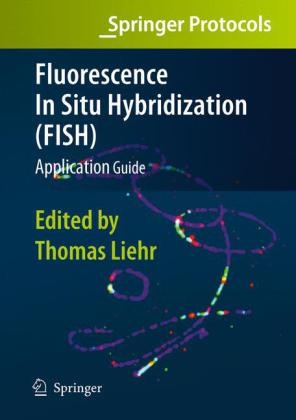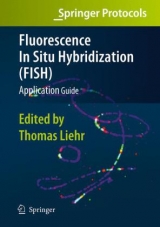Fluorescence In Situ Hybridization (FISH) - Application Guide
Springer Berlin (Verlag)
978-3-540-70580-2 (ISBN)
- Titel erscheint in neuer Auflage
- Artikel merken
This book is a unique source of information on the present state of the exciting field of molecular cytogenetics and how it can be applied in research and diagnostics. The basic techniques of fluorescence in situ hybridization and primed in situ hybridization (PRINS) are outlined, the multiple approaches and probe sets that are now available for these techniques are described, and applications of them are presented in 36 chapters by authors from ten different countries around the world. The book not only provides the reader with basic and background knowledge on the topic, but also gives detailed protocols that show how molecular cytogenetics is currently performed by specialists in this field. The FISH Application Guide initially provides an overview of the (historical) development of molecular cytogenetics, its basic procedures, the equipment required, and probe generation. The book then describes tips and tricks for making different tissues available for molecular cytogenetic studies. These are followed by chapters on various multicolor FISH probe sets, their availability, and their pot- tial for use in combination with other approaches. The possible applications that are shown encompass the characterization of marker chromosomes, cryptic cytogenetic aberrations and epigenetic changes in humans by interphase and metaphase cyto- netics, studies of nuclear architecture, as well as the application of molecular cytogenetics to zoology, botany and microbiology.
Molecular Cytogenetics, Probes and Equipment.- Molecular Cytogenetic Applications in Diagnostics and Research: An Overview.- Molecular Cytogenetics: The Standard FISH and PRINS Procedure.- Generation of Paint Probes by Flow-Sorted and Microdissected Chromosomes.- ISH Probes Derived from BACs, Including Microwave Treatment for Better FISH Results.- PNA-FISH Technique for In Situ Assessment of Aneuploidy.- Oligonucleotide FISH Probes.- Microscopy and Imaging Systems.- Optical Filters for FISH.- FISH With and Without COT1 DNA.- FISH Applications in Different Tissue Preparations.- Pre- and Postnatal Diagnostics and Research on Peripheral Blood, Chorion, Amniocytes, and Fibroblasts.- Prenatal Diagnostics on Uncultured Amniocytes.- Tumorcytogenetic Diagnostics and Research on Uncultured Blood or Bone Marrow and Smears.- Application of FISH to Archival Cytogenetic Slides.- Characterization of Mosaicism in Various Easy-to-Acquire Body Tissues Such as Buccal Smears, Hair Root Cells or Urine.- Characterization of Archived Formalin-Fixed/Paraffin-Embedded or Cryofixed Tissue, Including Nucleus Extraction.- FISH on Sperms, Spermatocytes and Oocytes.- Characterization of Marker Chromosomes.- Multiplex FISH and Spectral Karyotyping.- Tips and Tricks for mFISH.- Simultaneous Fluorescence Immunostaining and FISH.- Color-Changing Karyotyping (CCK), an M-FISH/SKY Alternative.- Three-Color FISH for the Detection of Individual Radiosensitivity.- FISH Banding Techniques.- cenM-FISH Approaches.- Characterization of Cryptic and Epigenetic Aberrations.- Subtelomeric and/or Subcentromeric Probe Sets.- Quantitative DNA Fiber Mapping.- Parental Origin Determination FISH: Pod-FISH.- Interphase FISH and Characterization of the Nuclear Architecture.- Interphase FISH: Detection of Intercellular Genomic Variations and Somatic Chromosomal Mosaicism.- Three-Dimensional Interphase Analysis Enabled by Suspension FISH.- Applications of FISH in Zoology, Botany and Microbiology.- Animal Probes and ZOO-FISH.- FISH Targeting of Chromosomes and Subchromosomal Regions in Yeast.- FISH on Insect Cells Transfected with Heterologous DNA: A Single-Cell-Directed Approach.- FISH on Plant Chromosomes.- FISH in Food Microbiology.- Comparative Genomic Hybridization (CGH) and Array CGH.- Micro-CGH: Microdissection-Based Comparative Genomic Hybridization.- Array CGH: Opening New Horizons.- Internet Links for FISH.- FISH and Chips on the Internet.
From the review of the previous edition "FISH Technology - Springer Lab Manual", edited by B. Rautenstrauß and T. Liehr
"It is a book that would complement the library of any lab performing FISH experiments and would bring new technologies to labs already scaling the heights or to labs setting out on their journey. ... One of the strengths of this book is the description of FISH techniques that have been developed to answer more specific questions about DNA structure and behaviour. ... My PhD student has recently been using this book and praised it without knowing I was reviewing it - what better endorsement could there be?" (Joanna M. Bridger, Cell and Chromosome Biology Group, Brunel University, Middlesex, UK, Journal of Cell Science 116, 2375-2376 © 2003 The Company of Biologists Ltd doi:10.1242/jcs.00594)
"Ever wondered how to catch your FISH ... in the dark pools of cellular biology? Then ... FISH technology might be a welcome addition to your library. Thirty-six chapters on 485 pages compile the latest protocols and background information on fluorescence in situ hybridization (or FISH) ... . Every chapter is illustrated by several schematic drawings ... . The manual is completed by a subject index ... . The book is certainly clear ... providing valuable protocols for both beginning FISHers and for FISH experts." (Dr. Jan Roelof Van der Meer, BioWorld, Issue 6, 2002)
| Zusatzinfo | XVIII, 451 p. |
|---|---|
| Verlagsort | Berlin |
| Sprache | englisch |
| Maße | 155 x 235 mm |
| Gewicht | 914 g |
| Themenwelt | Naturwissenschaften ► Biologie ► Mikrobiologie / Immunologie |
| Schlagworte | Bone • Chromosom • Comparative genomic hybridization • cytogenetics • DNA • Epigenetic aberrations • Fluoreszenz in situ-Hybridisierung • Genetics • Hybridization • Interphase • Labeling techniques • Marker chromosomes • Microscopy • Nuclear architecture • PRINS • termination • tissue |
| ISBN-10 | 3-540-70580-5 / 3540705805 |
| ISBN-13 | 978-3-540-70580-2 / 9783540705802 |
| Zustand | Neuware |
| Haben Sie eine Frage zum Produkt? |
aus dem Bereich





